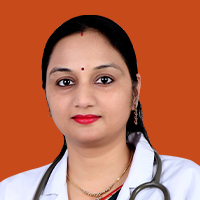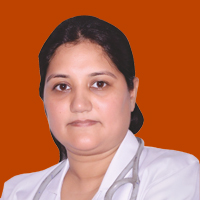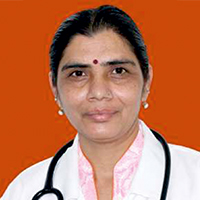

Successful Treatments
Clinics
Doctors
What is Menopause?
Menopause represents a natural biological process that signifies the conclusion of a woman's reproductive years. It is defined as the permanent cessation of menstruation, which is typically confirmed after a span of 12 consecutive months without a menstrual period. This transition transpires as a result of the decline in the production of ovarian hormones, predominantly estrogen and progesterone. Although the average age at which Menopause occurs is approximately 51 years, it may arise either earlier or later.
Perimenopause refers to the transition period before Menopause when hormonal fluctuations are more unpredictable and irregular bleeding may start. Throughout these years, women commonly undergo an incredibly diverse range of symptoms. Postmenopause is the term referring to the stage after Menopause.
In Ayurveda, menopause is considered a natural transition and not a health concern. Ayurveda says there are three major energies or doshas within your body: Vata, Pitta and Kapha. When these doshas get out of balance, menopause symptoms can be seen. For example, if your Vata becomes too strong, you will feel anxious, have dry skin or sleep poorly. If your Pitta is aggravated, you may experience hot flashes, irritability and night sweats.
These doshas are brought back into balance in Ayurvedic treatment. This is done with natural herbs, detox therapies, diet and lifestyle changes. The goal isn't to treat the symptoms but to strengthen your whole body and mind through this transition.
Stages of Menopause
Menopause doesn't happen overnight. Your body goes through it in stages. When you clearly understand these stages, this will help you get ready for and manage your symptoms. The three major stages of menopause are:
- Perimenopause (First stage): Perimenopause starts in your 40s or late 30s. During this time, your hormone levels change. You might notice your periods become heavier, lighter or sometimes even skip months. You might also notice early signs like hot flashes, mood swings and difficulty sleeping. Despite these changes, you can still become pregnant at this stage.
- Menopause (Second stage): You hit menopause if you have not had a period for twelve months consecutively. This is when your ovaries stop releasing eggs and producing most of their hormones. In this stage, you will see symptoms like night sweats, vaginal dryness, weight gain, and forgetfulness. It can be a tough phase physically and psychologically. But what you should remember is that this is a natural part of your life.
- Postmenopause (Third stage): After you have gone through 12 months without a period, you enter Postmenopause. Most of the menopause symptoms decrease slowly during this stage. However your body contains much less estrogen, and that raises your risk of conditions like osteoporosis and heart problems. It is important that you stay healthy during this time by eating right, exercising regularly and getting regular checkups with your Ayurvedic doctor.
Common Causes of Menopause
As we have discussed, menopause is basically the conclusion of your menstrual cycle and this process is a natural part of your life. It generally comes between the age of 45 and 55 for most women, but it may also come later or earlier for some women. You may go through menopause for several reasons:
- Natural hormone changes: As you grow older, your ovaries produce less of the female hormones, i..e, estrogen and progesterone. These hormones regulate your periods and fertility. With lower levels, your periods may become irregular before stopping completely.
- Surgical procedure to get rid of ovaries (oophorectomy): If you have had surgery to remove both ovaries, you will experience sudden menopause. This is because your ovaries supply nearly all progesterone and estrogen. Without them, you might experience symptoms like hot flashes and mood swings more strongly.
- Surgical procedure to get rid of the uterus (hysterectomy): In case your uterus is removed but your ovaries are still intact, you won't have periods anymore, but you might not enter immediate menopause. Your ovaries can still make hormones for some time.
- Chemotherapy and radiation: Cancer treatments such as radiation or chemotherapy to the pelvic area can harm your ovaries and cause premature menopause. It is possible that your periods may return after the treatment, but menopause happens permanently in many cases.
- Primary ovarian insufficiency: Rarely, women under 40 years of age experience early menopause simply because their ovaries don’t work properly. This is called primary ovarian insufficiency and it can happen due to autoimmune or genetic diseases.
Jiva Ayunique™ Treatment Philosophy - A Holistic Approach to Menopause
Menopause is a normal, natural life process that does not require any treatment. However, the symptoms and complications of it can make life somewhat difficult. Jiva Ayurveda offers completely natural Ayurvedic treatment for Menopause-related complications using evidence-based Ayurvedic methods. Our treatment plans focus on targeting the root causes of a difficult Menopause, and instead of just managing the symptoms, they focus on holistic healing, balance, and stability.
Core Principles of the Jiva Ayunique™ Treatment Philosophy
- HACCP Certified Ayurvedic Medicines: These are specially prepared herbal formulas that will bring your body back into balance and support a more stable mind.
- Yoga, Meditation & Mindfulness: Gentle exercises and breathing methods to relax your body, clear your mind, and improve your complete well-being.
- Ayurvedic Therapies: Cleansing treatments like Panchakarma and soothing massages to rid your body of toxins and bring your mind and body back in balance.
- Healthy Diet & Lifestyle Guidance: Expert advice on eating right and simple daily changes to keep you healthy and feeling your best naturally.
Ayurvedic Medicines for Menopause
Ayurveda provides natural and gentle ways to manage your menopause symptoms. As per Ayurveda, several herbs can help to balance your hormones, give you more energy, and improve your overall health. Some important Ayurvedic herbs to help you feel better in this phase of your life are:
Ashwagandha
Ashwagandha is believed to reduce anxiety, improve sleep, and fill you with energy. It also supports your muscles and nerves, helping with weakness and tiredness during menopause.
Shatavari
Shatavari balances female hormones. It relieves signs like hot flashes, night sweats and vaginal dryness. It also supports your reproductive system and reduces bleeding and cramps.
Guduchi (Giloy)
Guduchi is known to improve immunity, liver health and detoxify your body. With this, it prevents bleeding and also keeps you hydrated during heavy periods.
Brahmi
Brahmi is what we call a brain tonic in Ayurveda. It helps to increase your memory, focus, and mental clarity. It also calms your mind and promotes better circulation, reducing stress and brain fog.
Licorice
Licorice contains plant-based estrogens that mimic natural hormones. It helps to balance your hormones, reduces hot flashes and moderates mood swings. It also supports adrenal health, which is disturbed during hormonal changes.
Turmeric
Turmeric has anti-inflammatory properties. It eases joint pain, stiffness, and swelling caused by menopause. It also keeps your bones and joints healthy.
Sariva (Indian Sarsaparilla)
Sariva cools your body. It reduces hot flashes and night sweats. It also purifies your blood and improves the appearance of your skin.
Rhodiola Rosea
Rhodiola fights fatigue, increases stamina and restores your sleep cycle. It is helpful for women who feel too tired during menopause.
Ginger
Ginger helps to build bone mass. Its anti-inflammatory and antioxidant qualities keep your joints healthy and avoid bone problems.
Sesame Seeds
Sesame seeds contain calcium and help to improve your bone density, avoiding osteoporosis following menopause.
Jatamansi
Jatamansi strengthens your bones and helps to retain bone density. It is also useful for mental relaxation and stress reduction.
Niranjan Phal
Niranjan Phal is used to control heavy bleeding during periods. It relieves excessive blood loss and promotes faster wound healing.
Sage
Sage has long been used in Ayurveda for managing signs like hot flashes and night sweats. It also balances your mood and improves emotional health during menopause.
Evening Primrose
Evening primrose oil is known to relieve hot flashes and night sweats during menopause. It also improves your skin health and hormonal balance.
Moringa
Moringa leaves are rich in iron and other nutrients. They increase hemoglobin in your blood and thereby help in preventing anemia (which can happen during menopause).
Fenugreek Seeds
Fenugreek seeds support the production of red blood cells and prevent anemia naturally. They also keep your body strong and energetic.
Pumpkin Seeds
The seeds of pumpkin are rich in iron and other minerals. They help to raise your hemoglobin levels and improve overall blood health.
Shankhpushpi
Shankhpushpi calms your mind, reduces stress, and improves sleep quality. It is very helpful for women who experience insomnia during menopause.
Vacha
Vacha is another calming Ayurvedic herb that relaxes your nervous system and promotes better sleep and relaxation.
Sarpagandha
Sarpagandha is a natural sedative that relaxes your brain and induces peaceful sleep. This is good if you are struggling with insomnia and restlessness during menopause.
Ayurvedic Treatment for Menopause
Menopause is considered a natural shift in Ayurveda, associated with the Vata dosha (air and space element) becoming more predominant. Ayurvedic treatment seeks to balance the doshas and promote general well-being in this stage.
Jiva’s evidence-based ayurvedic approach towards Menopause may include,
- Herbal medicines: Shatavari, Ashwagandha, and licorice are used to regulate hormones, reduce hot flashes, and enhance mood.
- Panchakarma treatments: Detoxification treatments help remove toxins and rebalance the doshas.
- Additionally, lifestyle modifications and dietary modifications, alongside stress management techniques and good hygiene, are integral parts of the ayurvedic course of treatment and effective management of Menopause.
Diet & Exercise
Diet and exercise are the most important tools in managing Menopause symptoms naturally:
- Diet: A well-balanced diet that contains foods with good content of phytoestrogens, such as soy, flaxseeds, and legumes. Include a good quantity of whole grains, fruits, vegetables, and healthy fats. Reduce the consumption of processed foods, caffeine, alcohol, and spicy foods, which may trigger hot flashes.
- Exercise: The moderate exercises, including aerobic activities, strength training, and yoga, can enhance mood, sleep, bone health, and overall well-being.
Frequently Asked Questions
- Is Menopause a disease?
No, Menopause is a normal biological transition, not a disease.
- What is the age of Menopause?
The mean age is around 51 years, but it can vary.
- How long will the symptoms of Menopause last?
The time duration varies; however, the symptoms persist for a number of years.
- Is Hormone Replacement Therapy (HRT) safe?
HRT is safe and helpful in symptom relief but is not without potential risks. Talk to your doctor about the risks and benefits.
- Can Ayurveda alone replace traditional treatment for Menopause?
No, though Ayurveda can be an excellent adjunct therapy; the patient should seek consultation with both a medical doctor and an Ayurvedic practitioner.
- What are beneficial exercises during Menopause?
Yoga, walking, swimming, and strength training all are good exercises.
- Can changes in diet help hot flashes?
Yes, avoiding triggers, such as spicy foods, caffeine, and alcohol; and eating a balanced diet, which is high in phytoestrogens, can be helpful.
- Does stress worsen Menopause symptoms?
Yes, it does. Stress makes things worse. Techniques to help with stress management are beneficial.
- Are there any long-term health risks associated with Menopause?
Osteoporosis and heart disease risk are higher in women after Menopause.
- Can herbal remedies interact with other medications?
Yes, certain herbs can interact with prescription medications. Be sure to advise your doctor of any herbal supplements you are taking.
Top Ayurveda Doctors
Our Happy Patients
Social Timeline
Blogs
- Premature Menopause: Causes, Symptoms & Treatment
- An Herbal Approach To Dealing With Menopause
- Menopause: The Transitional Phase in a Woman?s Life
- Shatavari and Saffron Milk - The Menopause Miracle
- 7 Tips to Help You Sleep Better During Menopause
- Lifestyle Changes For a Smooth, Problem-Free Transition Into Menopause
Home Remedies
Related Disease
- Ayurvedic Treatment for Infertility
- Ayurvedic Treatment for Frigidity
- Ayurvedic Treatment for Leucorrhoea
- Ayurvedic Treatment for Menopause
- Ayurvedic Treatment for Adenomyosis
- Ayurvedic Treatment for Endometriosis
- Ayurvedic Treatment for Dysmenorrhea
- Ayurvedic Treatment for PCOS
- Ayurvedic Treatment for Vaginal Infection
- Ayurvedic Treatment For Vaginal Yeast Infection
- Ayurvedic Treatment for Hematuria
- Ayurvedic Treatment for Epididymitis
- Get Ayurvedic Treatment For Uterine Fibroids
- Ayurvedic Treatment for Hirsutism
- Get Ayurvedic Treatment for Menorrhagia
- Get Ayurvedic Treatment for Amenorrhea
Latest Blogs
- Migraine और भोजन का समय: देर से खाना सिरदर्द को क्यों बढ़ा देता है?
- क्या एंटीबायोटिक लेने के बाद पाचन पूरी तरह बिगड़ गया? आयुर्वेद के अनुसार Colitis के उपचार जानें
- अगर मामूली आहार भी पाचन तंत्र सहन न कर पाए तो Colitis को हल्का क्यों नहीं मानना चाहिए? आयुर्वेदिक दृष्टि से जानें
- लंबे समय से सक्रिय Colitis क्यों शरीर की रिकवरी क्षमता को कमज़ोर कर देती है? आयुर्वेदिक नज़र से जानें
- नॉर्मल एंडोस्कोपी, नॉर्मल रिपोर्ट्स… फिर भी रोज़ दर्द—IBS में गलत इलाज कैसे बीमारी को Chronic बना देता है! आयुर्वेदिक उपचार समझें
- क्या बाहर का खाना या मसालेदार भोजन आपके IBS को तुरंत ट्रिगर कर देता है? आयुर्वेदिक दृष्टि से समझें और कब Ayurvedic doctor से मिलना चाहिए जानें
- IBS में दवाइयाँ काम क्यों नहीं करतीं? आयुर्वेदिक कारण और उपचार समझें
- कभी कब्ज़, कभी दस्त: यह सिर्फ पाचन नहीं, पूरे सिस्टम का असंतुलन हो सकता है! जानें कब Ayurvedic doctor से मिलना ज़रूरी हो जाता है
- क्या सर्दियों में दवाइयों के बावजूद साँस पूरी नहीं खुलती? अस्थमा की जड़ आयुर्वेद से समझें
- क्या धूल, धुआँ या परफ्यूम से तुरंत साँस लेने में तकलीफ़ होती है? Asthma के ट्रिगर आयुर्वेद की नज़र से समझें
- सर्दियों में अस्थमा क्यों ज़्यादा बिगड़ जाता है? ठंडी हवा और कफ-वृद्धि का आयुर्वेदिक कारण जानें
- क्या ठंडी हवा लगते ही सीने में जकड़न और साँस लेने में परेशानी होती है? अस्थमा को आयुर्वेद की नज़र से जानें
- क्या सुबह उठते ही बलगम के साथ खाँसी आना अस्थमा का संकेत है? आयुर्वेद से समझें
- क्या लंबे समय तक लैक्सेटिव का उपयोग आपकी कब्ज़ को और जटिल बना रहा है? आयुर्वेदिक समाधान जानें
- क्या गैस, पेट फूलना और सिरदर्द का साथ में होना Chronic Constipation का क्लासिक पैटर्न है? आयुर्वेदिक व्याख्या समझें
- क्या सुबह नींद खुलते ही पेट साफ न होना ‘धीमी अग्नि’ का संकेत है? दीर्घकालिक कब्ज़ में आयुर्वेदिक कारण जानें next topic
- क्या लंबे समय तक बैठकर काम करने से आपकी कब्ज़ लगातार बढ़ रही है? आयुर्वेदिक दृष्टिकोण देखें
- क्या कब्ज़ के चलते आपकी नींद, ऊर्जा और पाचन सब प्रभावित हो रहे हैं? आयुर्वेद में इसके मूल कारण और ज़रूरी उपाय जानें
- क्या तनाव और चिंता भी Chronic Constipation का छुपा हुआ कारण बन सकते हैं? आयुर्वेदिक दृष्टि देखें
- क्या कई दिनों तक कठोर स्टूल बनना और पेट में ऐंठन रहना Chronic Constipation की पहचान है? आयुर्वेदिक संकेत समझें
Ayurvedic Doctor In Top Cities
- Ayurvedic Doctors in Bangalore
- Ayurvedic Doctors in Pune
- Ayurvedic Doctors in Delhi
- Ayurvedic Doctors in Hyderabad
- Ayurvedic Doctors in Indore
- Ayurvedic Doctors in Mumbai
- Ayurvedic Doctors in Lucknow
- Ayurvedic Doctors in Kolkata
- Ayurvedic Doctors in Patna
- Ayurvedic Doctors in Vadodara
- Ayurvedic Doctors in Ahmedabad
- Ayurvedic Doctors in Chandigarh
- Ayurvedic Doctors in Gurugaon
- Ayurvedic Doctors in Jaipur
- Ayurvedic Doctors in Kanpur
- Ayurvedic Doctors in Noida
- Ayurvedic Doctors in Ranchi
- Ayurvedic Doctors in Bhopal
- Ayurvedic Doctors in Ludhiana
- Ayurvedic Doctors in Dehradun









































